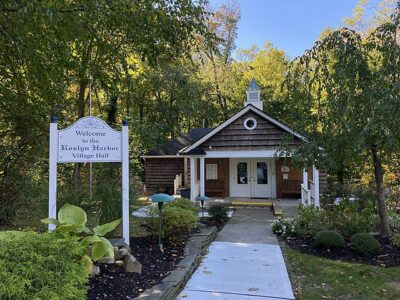
The Roslyn Harbor Board of Trustees instated a moratorium on road openings Thursday night, which will prevent residents from opening up roads for repairs unless absolutely necessary.
The Board of Trustees held a public hearing Thursday night to consider the new moratorium, which will be in place for the next five years.
Road openings are when the pavement is disturbed, typically through excavations or cutting open roads, requiring them to be repaired after the fact.
Mayor Sandy Quentzel said that often the roads need to be cut open, and the continuous patching efforts after every road opening have influenced the village to impose the moratorium.
“It basically protects your road,” Building Superintendent Peter Albinski said. “Every time you put a hole in the road it decreases its lifespan, so that’s the intent and to protect the dollars we spent on the roads.”
Albinski said the village will notify residents when their roads will no longer be able to be opened, allowing them to schedule any sort of road opening prior.
“When you’re doing someone’s road, there should be an actual reach to the homeowners before you do it,” Village Attorney Kevin Walsh said.
Walsh and Albinski suggested the board implement a three-month notice to residents for road work scheduling, which the board opted to adopt into its law.
Quentzel said that in the incident of roads needing to be opened up during the moratorium, it would require the road to then be finished curb-to-curb, or a full-width road patch.
“This way it does protect the work we’ve just done and the money we’ve put into the roads,” Quentzel said.
The law will be implemented upon filing with the state, which the village’s clerk said they are in the process of doing.
The board also discussed the possibility of implementing a future law that would require nitrogen-reducing septic symptoms in certain scenarios, with many other local villages implementing similar laws.
Nassau County is pushing initiatives to implement nitrogen-reducing septic systems, which prevent the flow of nitrogen into local water sources.
“We do need to address the water quality because it’s only getting worse,” Albinski said. “…You can’t shut your eyes to it.”
The Village of East Hills implemented a local law in September that would require new construction and substantially improved buildings to implement nitrogen-reducing septic systems.
Trustee Abby Kurlender said that if the village were to require it for new construction and substantial renovations, she would also suggest it be required for new systems if an old septic system fails.
Kurlender also suggested it be implemented when properties are transferred, but Quentzel said the village is not always notified when properties are transferred which would make enforcement difficult.
Albinski said he will work to coordinate a presentation at the board’s next meeting so they can gather more information before making a decision on implementing a law.
The Roslyn Harbor Board will convene again on Oct. 26, where they will continue discussions on nitrogen-reducing septic tanks and hold a public hearing to establish no parking on the streets during snow emergencies.






